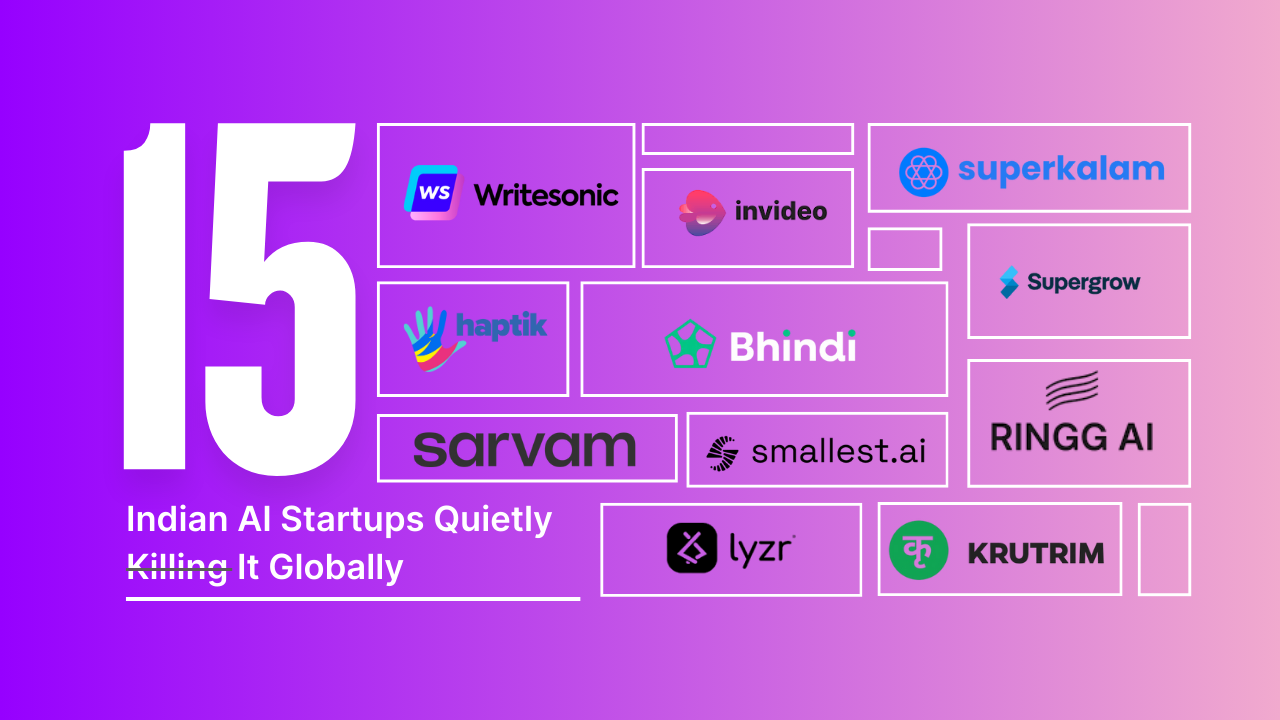So what’s the first thing that comes to your mind when you think of AI startups that are killing it globally? My guess is you probably thought of OpenAI, Anthropic, Midjourney, and maybe some others. But what if I told you that there are 15 AI startups from India that are actually killing it globally? And I can bet that most of you haven’t even heard their names before. But the numbers these companies have… their growth, their revenue, their customer base is just insane.
So let’s check them out.
1. InVideo AI
The first company is called InVideo AI. It’s an AI video editor that helps you create videos from just a script. Now, all of us have seen their ads. They’ve spent a lot of money. But what’s special about them is that they have more than 60,000 signups every single day, which is insane. Founded in 2017, the company has raised over $52.5 million in funding with a valuation of $200 million. InVideo AI’s “Magic Box” feature lets you edit videos with a simple text prompt, and its generative AI can create visuals and realistic voiceovers in over 50 languages, making video creation faster than ever.
2. Sarvam AI
The second company is called Sarvam AI. It’s a very new company, but it’s very hot right now because they’re building India’s own LLM that understands and speaks 22 Indian languages. It’s a government-backed company that has already raised over $41 million in funding. Co-founded by Dr. Vivek Raghavan, a key figure from the Aadhaar project, Sarvam AI’s mission is to make generative AI truly accessible and relevant for the Indian population, ensuring the technology can communicate and understand the nuances of Bharat.
3. BhindiAi
The third one is BhindiAi. What is BhindiAi? Bhindi AI is an agentic AI platform that aims to be an “everything app” by moving beyond basic chat-based interactions to autonomous, task-executing AI agents. Users can delegate complex, multi-step workflows through a single prompt, with agents like crypto trackers or marketing assistants handling tasks in the background. Founded by Sowmay Jain, Bhindi AI raised $4 million in pre-seed funding to tackle “AI fatigue” by reducing friction in digital workflows for professionals and businesses.
4. Writesonic
The fourth one is Writesonic. If you’re a content creator, you’ve probably heard of them. It’s an AI content maker that helps you create blogs, ads, and social media posts. The reason why they’re so special is that they’re a company from India that’s having more than $8 million in ARR (Annual Recurring Revenue). That’s massive. Writesonic is now positioning itself as an “AI Search Visibility & Optimization Platform,” helping businesses get their content cited by leading AI platforms like ChatGPT and Gemini.
5. Ringg AI
The fifth one is Ringg AI. Ringg AI is a real-time voice bot that can help you with making calls, booking meetings, and updating CRMs. They’ve raised over $1.11 million in funding. This Bengaluru-based company’s AI voice assistants are used for everything from lead generation and debt collection to appointment booking. The platform is known for its low latency—under 330ms—and can handle up to 10,000 concurrent calls, with a remarkable 99.9% adherence rate.
6. Haptik
The next one is Haptik. Now Haptik is a chatbot platform for businesses, and they have over 300 million customers from Jio. That’s a massive, massive, massive number. Founded in 2013, it was a pioneer in India’s conversational AI space and was acquired by Reliance Industries for $100 million in 2019. Haptik has proven its ability to handle immense scale, a key example being the MyGov Corona Helpdesk, a massive government chatbot they built to provide information during the pandemic.
7. Composio
The next one is Composio. Composio is an infra for AI agents. So if you have an AI agent, you can connect it with all the tools that you want—be it GitHub, be it Jira, be it Sheets. It helps you connect your AI agents securely to the platforms you use, and they have more than 100,000 developers who are already using them. Positioned as the “action layer” of the AI stack, Composio allows AI agents to reliably interact with over 10,000 tools, and recently raised a Series A round led by Lightspeed Venture Partners.
8. Emergent
The next one is Emergent. Emergent is an app that helps you create a full-stack application from just a plain English description. So you don’t have to code anything, and you can create a full-stack application just from what you say. It is also a YC-funded company. Emergent recently secured a $7 million seed round and has been ranked #1 on OpenAI’s SWE-Bench. The platform uses a multi-agent system to autonomously handle everything from ideation to coding, testing, and deployment, allowing users to go from idea to launch in minutes.
9. Supergrow
The next one is Supergrow. It’s a LinkedIn co-pilot. So it helps you draft posts, it helps you suggest comments, and it helps you schedule DMs. This Bengaluru-based, bootstrapped startup is an AI-based tool designed specifically to help professionals build and scale their personal brand on LinkedIn.
10. Krutrim AI
The next one is Krutrim. Krutrim is an AI company that’s building models and cloud services for India. They have their own speech model that is specifically tuned for Indian languages. They are also India’s first AI unicorn with a valuation of over ₹10,000 crore. With an annual revenue of ₹2,191 crore, Krutrim is building a full-stack AI ecosystem for India, with models like Krutrim Basic and Krutrim Pro designed for various use cases and industries.
11. Karya
The next one is Karya. Karya is an AI company that’s focused on creating ethical data for AI. It helps in designing, recording, and labeling Indian language datasets. They’ve successfully completed over 40 million data tasks already. As a social enterprise, Karya’s mission is to provide dignified, digital work to economically disadvantaged rural Indians, paying them fairly to collect and label data for AI models and providing them a pathway out of poverty.
12. Superkalam
The next one is Superkalam. Superkalam is a UPSC mentor. So it helps UPSC aspirants to get a daily plan, to get instant doubt clarification, to get mock tests, and it’s already helping more than 2 lakh aspirants with it. The platform uses AI to offer personalized guidance for one of the toughest exams in India, providing a comprehensive solution that includes daily study schedules, real-time doubt clearing, and automated answer evaluation.
13. Lyzr
The next one is Lyzr. Lyzr is a platform that helps you build low-code enterprise agents for your sales, your support, and your operations. The company was incorporated in 2024 and provides a low-code/no-code framework that allows both technical and non-technical users to build and deploy secure AI agents. It offers pre-built templates for specific business functions like HR and banking, enabling companies to quickly automate complex workflows.
14. Phot.AI
The next one is Phot.AI. Now Phot.AI is an AI tool for e-commerce visuals. So it helps in removing backgrounds, creating scenes, and editing product photos. It helps you reduce your manual work by more than 80%. The company has raised $2.7 million in seed funding and is valued at ₹100 crore. Phot.AI offers a suite of tools that go beyond e-commerce, including AI art generation, video enhancement, image upscaling, and even restoring old, damaged photos.
15. Smallest.ai
The last one is Smallest.ai. So Smallest.ai is a lightning-fast voice. You can clone your voice from a 10-second speech, and it will give you a voice in ultra-low latency. It is a voice AI platform that provides solutions for enterprise contact centers. Their “Lightning V2” product is known for being one of the world’s fastest and most human-like text-to-speech services, with a focus on delivering natural, low-latency speech for automated calls.
This is just a glimpse into the thriving AI ecosystem in India. These companies are not just building for the local market; they are creating world-class products that are solving global problems and competing on the world stage. Their success stories prove that with a unique idea and a strong focus, a startup from anywhere in the world can make a significant global impact. The next time you think of a leading AI company, remember that some of the most innovative ones might just be from India.


